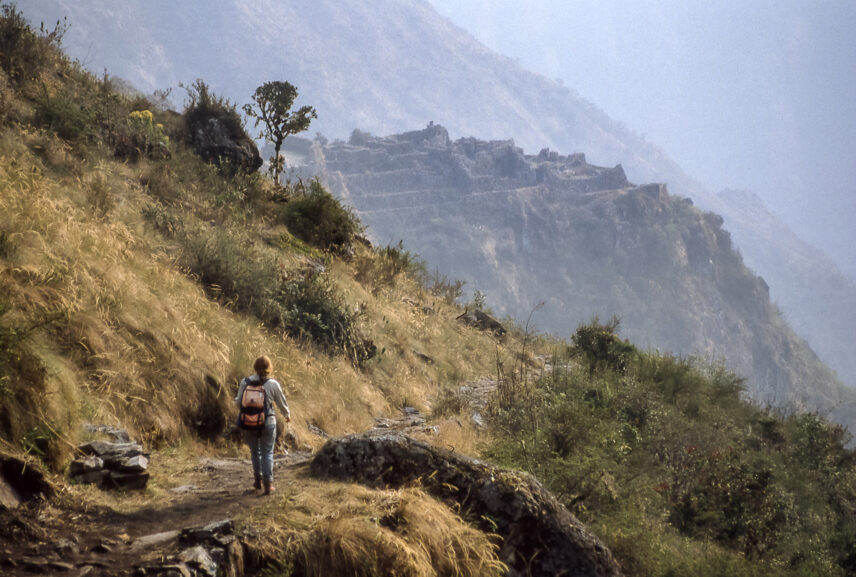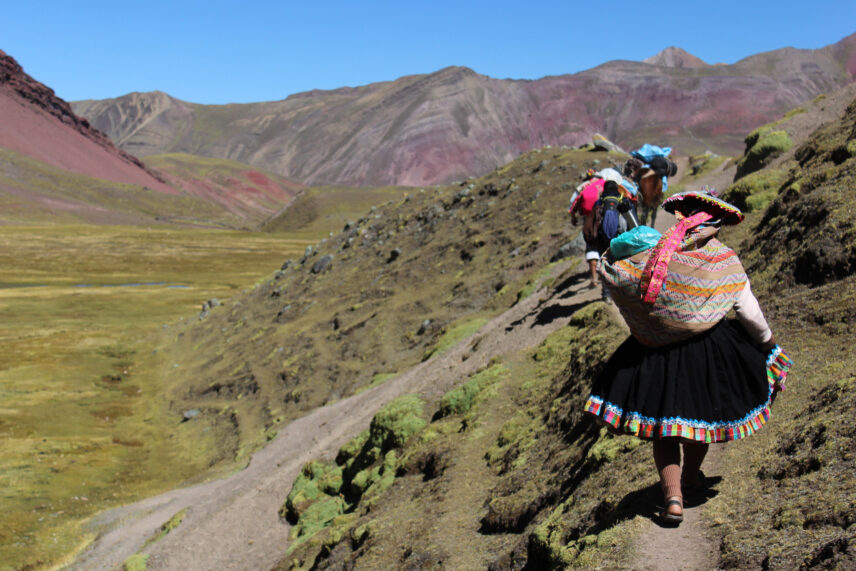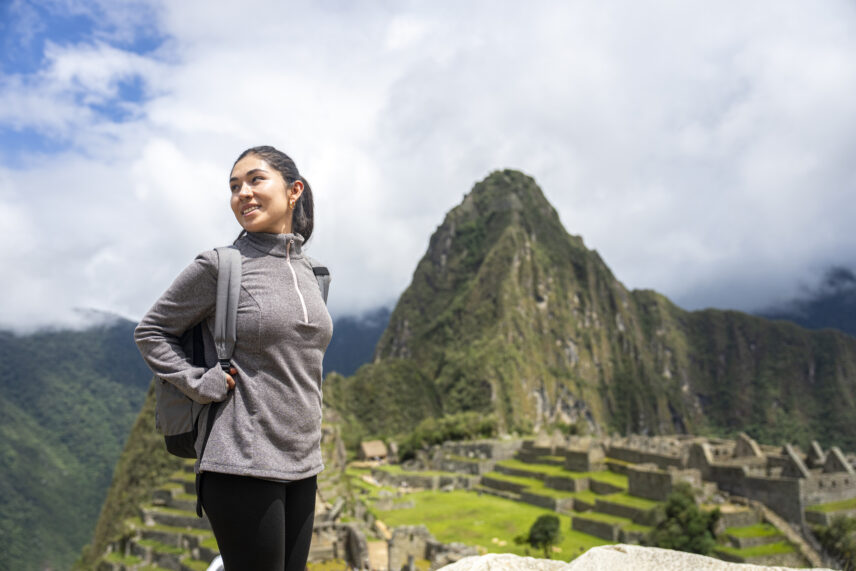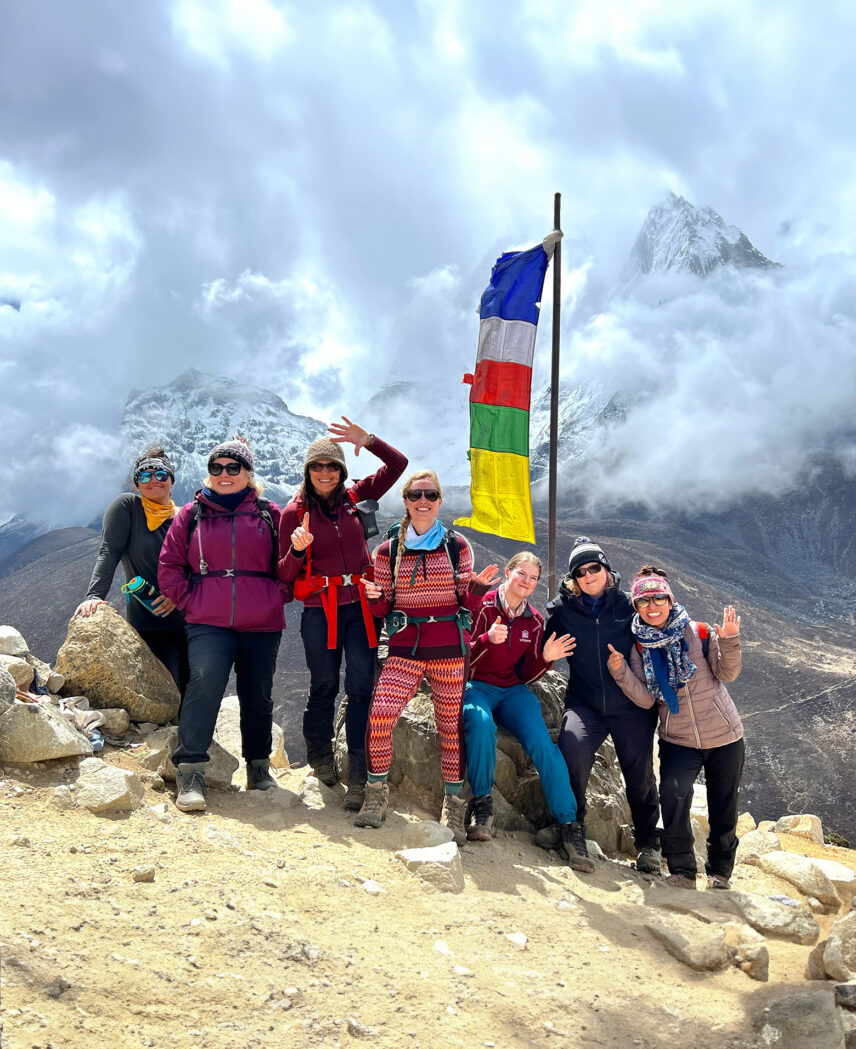The spiritual nature and physical challenge of the Inca Trail To Machu Picchu Trek have intrigued and enticed travellers for over 50 years.
Decades ago, trekkers had to be self-sufficient and were responsible for shouldering their own packs, setting up camp and devising their own menu plans. Over time, the Inca Trail has become more accessible and less daunting with the employment of porters.

Porters make the Inca Trail a better and more doable experience for Wild Women who may be unable to carry the weight of their full packs due to the altitude and terrain. On this multi-day trek, Wild Women are only responsible for transporting necessities like rain gear, snacks and water in their daypacks. The porters carry the essential camping equipment, food supplies and portable kitchens. They keep you comfortable and nourished while dreaming of Machu Picchu! Porters and Sherpas are also vital and valuable members of our team on the Patagonia Hiking Adventure and Trek to Everest Base Camp.
On the Inca Trail To Machu Picchu Trek, porters continue to be the true backbone of Peru’s tourism industry. While mules are used on the first day of the four-day 29-mile (47 km) trek, porters take over the cargo and the weight shifts from four-legged pack animals to the backs of male and female porters who cover the dodgy terrain with huge elevation gains on two legs. Many porters began working as teens (age 14 even)–the work provided a steady income to support their family, though it would take several years for equitable working conditions to emerge. Porters must now be 18 years old to work and their loads have become respectfully lighter.

Here’s a Tip
Before 1990, the Inca Trail was not regulated by the Peruvian government. Along with questionable porter working conditions, tourists failed to respect the trail. With no ranger supervision, the trail also suffered from litter from the heavy foot traffic. A limit was established on the number of tourists, Peruvians, and crew allowed on the trail daily. In 1990, that number was 500.
Currently, to walk the Inca Trail, you must obtain a permit in advance and enter with a licensed tour company–you are not allowed to trek the Inca independently. At Wild Women Expeditions, we handle permits for Wild Women who book the Inca Trail to Machu Picchu Trek–and these permits sell out fast! Chase down your dream of Machu Picchu; we can get you there, and know that your trek is made possible by the incredible efforts of the porters along the way.
Evolution is underfoot, and Wild Women Expeditions is wholly committed to supporting our Peruvian porters and providing them with a more sustainable, supportive, and healthy future. Each Inca Trail Trek includes a formal tipping ceremony on the morning of day six. As the group moves onward to Machu Picchu, it’s the last opportunity to say a grateful thank you to the lean and mean porter team. This ceremony demonstrates an appreciation for their kindness, encouragement, enthusiasm and rock-solid backs. Porters receive $5-10 USD from each Wild Woman, and depending on the group size, there are usually two porters per Wild Woman.
Lifting the Weight
Initially, there were no weight restrictions, and porters carried packs weighing 40 to 50 kilos (88-110 pounds). Porter laws were introduced in 2001, and weight control was enforced at 20 kilos (44 pounds) for men and 15 kilos (33 pounds) for women and younger porters–though companies offering cheaper treks didn’t adhere to the rules. If porters were carrying less weight, it required more porters on a trek and, in turn, more salaries being doled out.
Recent headlines have targeted the tourist agencies and operators who have failed to respect the rights and health of the porters dedicated to making dreams come true for visitors from around the world. Described as “the engine of the trail,” Peru would face a huge economic deficit if porters stopped working.
Older, seasoned porters are naturally growing weary of the 13 to 20-hour days that involve transporting gear for trekkers and setting up kitchen tents, dishwashing and assisting the chef. For some porters, employment by certain companies means no potable water, sleeping bags, mats, or tents to take refuge. They are required to carry their own firewood if they wish to prepare traditional meals like roasted corn or mote (boiled husked white corn kernels). Some sleep in the dining room tent on the trail or in bathrooms sitting up. The porters had no medical insurance or financial support if an injury sidelined them. Until recently, chefs and kitchen help earned more than the porters who were actually carrying the kitchen and provisions to them!
A Better Step Forward
In November 2022, the new 31614 Porter’s Law was approved by the Peruvian Congress and signed by Pedro Castillo, Peru’s president. The updated law requires that porters earn a salary of $ 140 USD for each four-day trip (this is double what they made in 2022). Tour operators must also provide porters with health insurance plans and accident insurance policies. The government has agreed to build shelters for porters to sleep in while on the trail. Another monumental change states that porters must rest for five days before they embark on another trip.
Wild Women trips in Peru support the highest standards for porters and trek staff. We are eager to invest in initiatives to build greater capacity for women to have employment as porters and guides on the Inca Trek as well.
Wild Women currently has a solid gold staff of 10 female porters. For those who have walked the Inca Trail with Wild Women, the strength and resilience of the Porter team have made it all possible. Due to a limit on the number of porters permitted per group, as well as a maximum weight they are permitted to carry (which is different between men and women), the number of female porters will vary per group and will depend on group size.
Wild Women will continue to encourage and create opportunities for Peruvian women seeking confidence, leadership and financial security on the Inca Trail.
Wild Women Expeditions offers several ways to experience Peru, from the classic Inca Trail to discovering the Sacred Valley on horseback or witnessing the truly wild side of the country via the Amazon on our Peru Explorer adventure.

